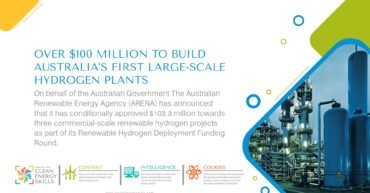The Queensland government has announced that it will establish a $2 billion clean energy fund as part of the state’s economic response to Covid-19 that will “supercharge” the state’s expansion of its renewable energy and green manufacturing industries.
Included in the $550bn bill are plans for a national hydrogen strategy and roadmap, at least four regional H2 hubs and billions of dollars for research and development.
Gasunie says the planned national hydrogen infrastructure will be the first large-scale retrofit of natural gas pipelines, making use of existing pipelines for 85% of the backbone to save substantially on costs. The project, with an estimated price tag of €1.5 billion ($1.77 billion), is scheduled for completion in 2027.
Already dubbed the “Hydrogen Olympics”, Tokyo 2020 is a showcase for the fuel of the future. As the most abundant element in the universe, hydrogen is clean and light. Most importantly, it produces no carbon dioxide emissions and can be produced using renewable electricity. Energy analysts believe hydrogen offers some of the best potentials to reduce or eliminate emissions from airlines, shipping and industry.
Participating in the project are Hokkaido Electric Power, renewable energy developer Green Power Investment, Nippon Steel Engineering and industrial gas supplier Air Water.
Egypt is planning to invest up to $4 billion in a project to generate green hydrogen via electrolysis, according to a report in Arab News, citing the Egyptian Minister of Electricity and Renewable Energy Mohamed Shaker.
The Queensland government has announced that it will establish a $2 billion clean energy fund as part of the state’s economic response to Covid-19 that will “supercharge” the state’s expansion of its renewable energy and green manufacturing industries.
In recent weeks, the buzz around the potential for hydrogen to unlock opportunities to export renewable energy to the world has gone from a light murmur to a loud hum.
An early-stage technology startup company is developing a new process for the production of hydrogen from seawater or brine without the need for desalination.
On behalf of the Australian Government, the Australian Renewable Energy Agency (ARENA) has announced that it has conditionally approved $103.3 million towards three commercial-scale renewable hydrogen projects, as part of its Renewable Hydrogen Deployment Funding Round.









